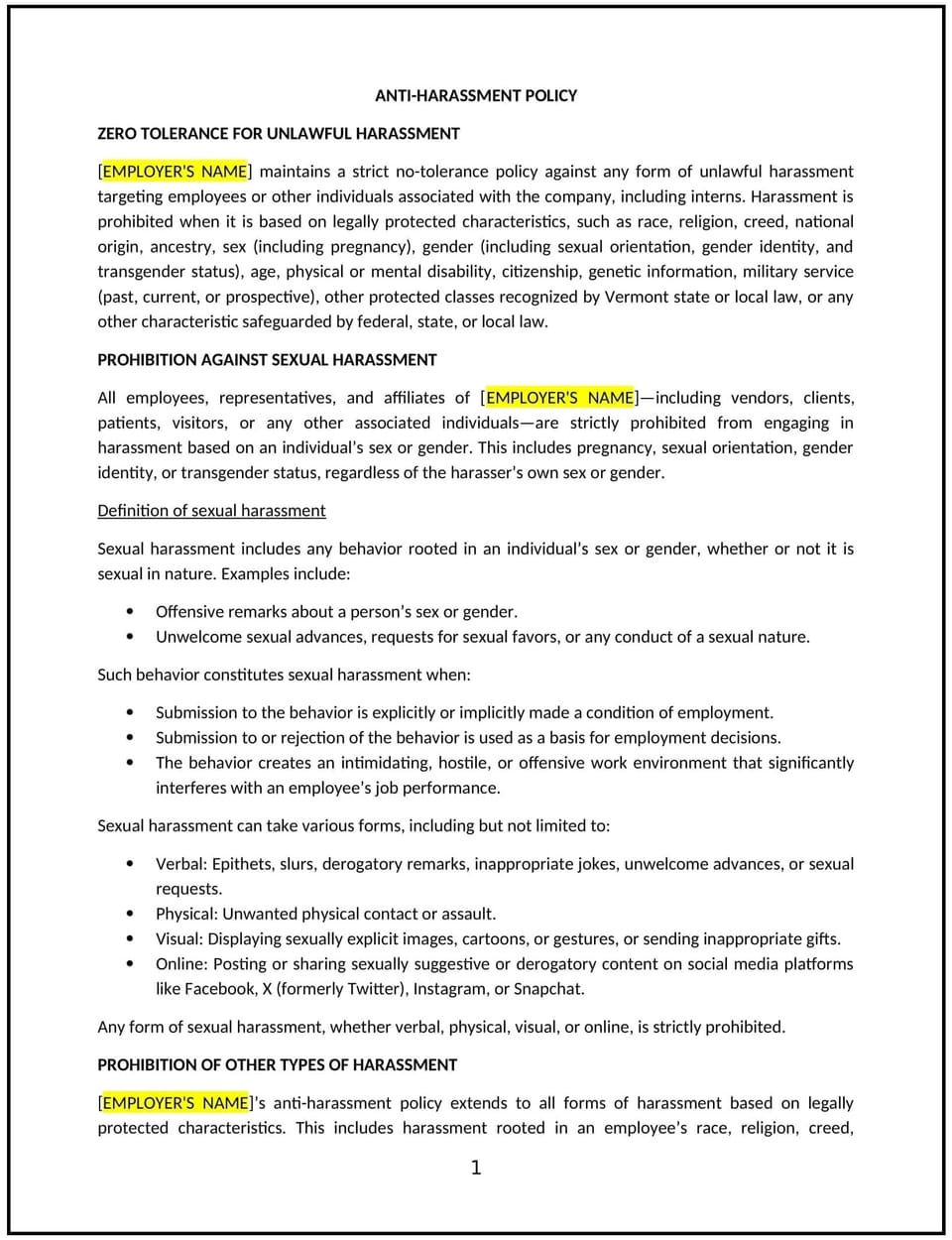Anti-harassment policy (Vermont): Free template

Anti-harassment policy (Vermont)
This anti-harassment policy is designed to help Vermont businesses create a workplace free from harassment, discrimination, and inappropriate behavior. It outlines guidelines for identifying, reporting, and addressing harassment while promoting compliance with Vermont state laws, including the Vermont Fair Employment Practices Act (VFEPA).
By adopting this policy, businesses can foster a respectful and inclusive environment while mitigating legal risks.
How to use this anti-harassment policy (Vermont)
- Define harassment: Clearly specify what constitutes harassment, including verbal, physical, and visual conduct that creates a hostile work environment.
- Prohibit discrimination: Emphasize that discrimination based on protected characteristics, such as race, gender, age, religion, or disability, is strictly prohibited.
- Establish reporting procedures: Provide employees with clear channels to report harassment, such as HR or a designated manager, and assure confidentiality.
- Include investigation protocols: Detail how reports of harassment will be addressed, including timelines, confidentiality, and corrective actions.
- Reinforce non-retaliation: Guarantee that employees who report harassment or participate in investigations are protected from retaliation.
- Mandate training: Require anti-harassment training for all employees and supervisors to prevent and address inappropriate behavior.
- Monitor compliance: Regularly review workplace practices and update the policy to align with Vermont laws and workplace needs.
Benefits of using this anti-harassment policy (Vermont)
This policy provides several benefits for Vermont businesses:
- Promotes respect: Fosters a workplace culture of mutual respect and professionalism.
- Enhances compliance: Aligns with Vermont state laws, including VFEPA, and reduces legal risks.
- Encourages reporting: Provides employees with clear, safe, and confidential avenues to report harassment.
- Supports accountability: Establishes procedures for investigating and addressing harassment effectively.
- Improves retention: Demonstrates the company’s commitment to employee well-being and inclusivity.
Tips for using this anti-harassment policy (Vermont)
- Communicate the policy: Share the policy with employees during onboarding and ensure it is included in the employee handbook.
- Provide training: Offer regular anti-harassment training to all employees and supervisors, emphasizing Vermont-specific legal requirements.
- Encourage transparency: Foster a workplace culture where employees feel comfortable reporting incidents without fear of retaliation.
- Document incidents: Maintain records of all reported harassment cases, investigations, and outcomes to ensure transparency and compliance.
- Update regularly: Revise the policy to reflect changes in Vermont laws, workplace dynamics, or industry standards.
Q: What behaviors are considered harassment under this policy?
A: Harassment includes verbal, physical, or visual conduct that demeans or offends someone based on protected characteristics, such as race, gender, or religion, or creates a hostile work environment.
Q: How can employees report harassment?
A: Employees can report harassment to HR, a supervisor, or a designated manager through the company’s reporting channels, with assurance of confidentiality.
Q: What happens after a harassment report is made?
A: The company will conduct a prompt and thorough investigation, maintain confidentiality, and take corrective actions if harassment is confirmed.
Q: Are employees protected from retaliation for reporting harassment?
A: Yes, employees who report harassment or participate in investigations are protected from retaliation under this policy and Vermont law.
Q: Is training on harassment prevention mandatory?
A: Yes, all employees and supervisors are required to participate in anti-harassment training to promote a respectful workplace.
Q: How does the company ensure confidentiality during investigations?
A: Investigations are conducted discreetly, with information shared only on a need-to-know basis to protect the privacy of all parties involved.
Q: How often is this policy reviewed?
A: This policy is reviewed annually or whenever significant changes occur in Vermont laws or workplace practices.
Q: Does this policy apply to contractors and visitors?
A: Yes, this policy applies to all individuals on company premises, including contractors, visitors, and other non-employees.
This article contains general legal information and does not contain legal advice. Cobrief is not a law firm or a substitute for an attorney or law firm. The law is complex and changes often. For legal advice, please ask a lawyer.


